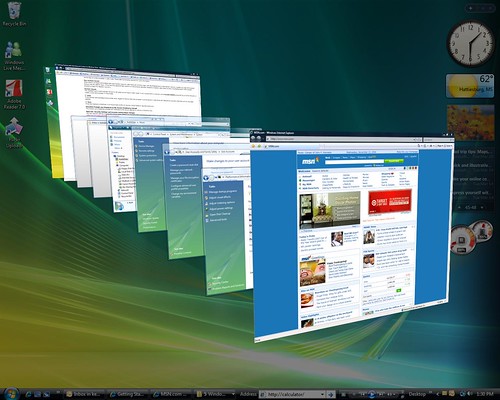Vista a Boon or Blog?: The Uncertain Factor
1. User Account Control (UAC)
You are browsing through your folders, installing new software and downloading stuffs via internet...you clicked on one of the icons, wanting to run the program by your own will. Suddenly, everything darken out and in another few seconds, a message popped up, asking you whether you would like to continue. At first, you wouldn't mind at all, but after attempting to execute more software, using utilities on Vista and executing a downloaded file, you are starting to get annoyed by the extensive delays and prompts...the next thing you know, you are complaining and simultaneously hearing other people complaining the new, annoying stuff.

Yup. That's the new features of Windows Vista: the User Account Control feature.
Annoyed, yes. But here's the case: UAC exists for a reason!
Remember that one of the things Windows users complaint a lot on Windows XP & previous versions of Windows is their poor defenses against security issues such as intrusion, malwares and viruses? Microsoft attempt to answer that by providing this new feature on Vista. Believe me, it seriously does increase protection and security by prompting users and asking for reconfirmation every time users execute a software, thereby preventing the auto launch of unwanted programs (some malwares and viruses are designed with autolaunch capabilities). While users praised Microsoft for having provided something which really says the word "security", one question remains: does this new security features outweight its weakness?
People complaint of the extensive pop-ups of this feature; some raged at its common knack of slowing down PCs, others gradually find it tiresome especially when launching trusted software even of Microsoft's own production. Users who show expertise in computering security simply dismissed the feature as a joke, claiming that they are skilled enough to boost their PC security by themselves and believe that they have the knowledge of knowing what is going on with the security of their systems. Even newbies suggest that Microsoft should find new ways of providing security other than providing this so-called"feature bloat".
Microsoft responded towards user complaints well; they provide updates which reduces the amount of software handled by UAC, provide patches to increase UAC's performance and even permitting famed security company, Norton of Symantec Corporation, to develop a similar program called Norton User Account Control, which makes UAC more user friendly, configurable and of course, less annoying...:)
 Norton User Account Control...notice that it gives you some configuration options?
Norton User Account Control...notice that it gives you some configuration options?I am not a fan of the UAC, since i profess myself capable of managing computer security quite well and at the same time, loathed the UAC annoyance. Nevertheless, i do suggest that if you are not so sure on how to manage PC security, leaving the UAC on will actually do more good than harm. I do praise UAC, but at the same time, i find UAC condemnable as well. I thus listed UAC under my list of uncertain factors in Vista features.
2. Internet Explorer 7 (IE7)

Although Internet Explorer still dominates the world's leading market share in Internet Browsers, i rarely find it appealing. Currently, the browser i use the most is Mozilla Corporation's Firefox browser, which in my opinion, is slightly faster and twice even more secure than Internet Explorer. In my entire computing experience, Internet Explorer is prone to bugginess and by introducing its own ActiveX controls and scripts, Internet Explorer is pronouncedly less secure, often requiring security patches from Microsoft. Worst of all, i as a user, had never seen any browser which crashes as often as Internet Explorer did. When a single browser tab crashes, IE7 simply brought down all the tabs of browsing pages you're using...without a chance of recovery (Note that Firefox provide an option to reload all your browsing page on recovery, while Google Chrome uses separate memory for tab browsing, making its tabs independent and unmoved over other tab's crashes...).
Having said all that, i still do use IE7 for certain uses. IE7 takes me to some new websites on which Firefox & Chrome do not support, and IE7 is my browser of choice for video downloading via Realplayer (Firefox doesn't support RealPlayer). IE7 also serves as my first alternative when Firefox is unusable due to updates and bugginess. Not more on a few occasions, i even discovered that IE7 loads a few certain website pages faster than any other browsers.
Because IE7 makes my day and breaks my day equally, i still find it hard to judge whether it is good or bad. I list IE7 as my 2nd uncertain factor in Vista's features.
3. "Switch Between Windows" Function

Vista provided users an option to switch between windows with a simple push of the second quick launch button, located just on the lower left corner where your default start button is positioned. While i find it beautiful, elegant and occasionally useful, i do not find it handy. When there are tonnes of windows littering my desktop, i might remember using it. However, for most of the time my reaction to closing and opening another window directly is even faster than clicking the "switch between windows" shortcut itself and browse through the windows. Now that i apply a desktop manager on my Vista, i even had less cluttered windows, as i can organize my windows from virtual desktops to virtual desktops.
However, i still like the function and occasionally use it when i'm feeling lazy to switch to another virtual desktop. So, "Switch between Windows" earned a place in my uncertain factor of Vista features.

0 opinion:
Post a Comment